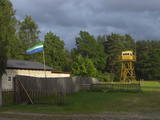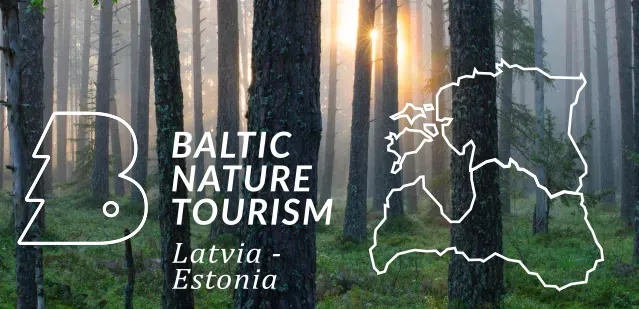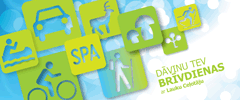“Back in Mazirbe” (excerpt)
It turned out that I was premature in rejoicing over a happy meeting with my godmother, because when we got to the Border Guard post at Mazirbe after travelling down a snowy and difficult road, it turned out that my documents were not the ones that were needed to be in a strictly controlled zone. The situation changed upside down.
In late January 1950, when university students were on their winter break, I was visiting my parents in Dundaga. I met a driver who was going to be driving through Mazirbe to Pitrags and then returning right away. That was a perfect way for me to visit my mother’s sister, Klāra Helmane, who lived in Mazirbe, at the Vecbunkas homestead. There was no scheduled bus service to Mazirbe at that time, and it was quite hard to get there. Aunt Klāra was a seamstress, and she’d sown my white smock for my studies at the Rīga Institute of Medicine. You couldn’t find such apparel at any store unless you knew someone.
It turned out that I was premature in rejoicing over a happy meeting with my godmother, because when we got to the Border Guard post at Mazirbe after travelling down a snowy and difficult road, it turned out that my documents were not the ones that were needed to be in a strictly controlled zone. The situation changed upside down. Instead of seeing Aunt Klāra’s bright and happy smile, I had to look at the face of a hung-over border guard yelling at me and saying that violators of the border regime should be shot so that they would stop messing up the great lives of Soviet people. I tried to object that I was a local – I’d lived in Mazirbe for nearly 10 years. I went to school there. During the German occupation I visited all of the homesteads to pass out the local newsletter. Nearly every dog, let alone human being would know who I was.
Nothing helped. It was to this man’s advantage to interpret me as a serious border regime violator who was caught at the scene of the crime. He was hoping for praise from his bosses or even a higher rank for his alertness. We can remember that border guards received praise and rewards even when they found a boot in the harrowed sand of the beach. This time the major thought that perhaps I had crossed the frozen sea from Sweden, which was rotting under its capitalist system. The Border Guard commander in this quiet part of Latvia probably thought that he had an excellent opportunity to climb the military career ladder. In order to achieve this, I was tossed into a cold wooden hut, and an armed guard, dressed in a warm woollen coat and with padded boots, was put there to guide me. I could see all of that on the cold winter night, because there were several cracks in the wooden walls, and the moon was out. I could see everything.
It was around -20 degrees Celsius outside, and it wasn’t much warmer in the hut. I feared that I would freeze. I hadn’t eaten or drunk anything all day, and the process had knocked me out in psychological terms. I was very tired. Still, I was 21 years old and absolutely did not want to die. I exercised and moved around as much as I could in the small hut. If I’d frozen to death, you wouldn’t have this article. Tens of thousands of patients would not have been treated, I would not have written books and nearly 60 scholarly articles. I wouldn’t have done experiments. I wouldn’t have submitted 33 rationalisation proposals to the Health Ministry. The melodies that I played and sang wouldn’t have sounded out. Much else would have gone missing. I think that I was aware of that, and so I survived this inhuman test of my strength. I suspect that my bloodstream contains a few drops of blood from the ancient Livs. My classmate, the well known poet Arnolds Auziņš, has written a good poem about the spiteful nature of the Livs:
“The Latvian works hard, indeed,
But the one who is always free in spirit,
The one who is independent and spiteful –
He certainly has ancestors who are Livs.”
Toward the morning I was taken to the train station and put on board. There was armed soldier from the eternally victorious and mighty Red Army at each door. They had bayonets on the ends of their guns. All along the trip, their ability to guard me was strengthened by a trained tracker dog and its human guide. That was the only time in my life that I was so “honoured.” The dog even guarded me when I was in the loo at the Mazirbe train station. Even a few of the wives of officers came to peek at this “spy who snuck in from abroad.”
Luckily, my sister Daina, who lived in Ventspils, managed to find the necessary documents and bring them to me by that time. Thus I immediately turned from a dangerous criminal into a useful citizen of the Soviet Union.
It turned out that I was premature in rejoicing over a happy meeting with my godmother, because when we got to the Border Guard post at Mazirbe after travelling down a snowy and difficult road, it turned out that my documents were not the ones that were needed to be in a strictly controlled zone. The situation changed upside down. Instead of seeing Aunt Klāra’s bright and happy smile, I had to look at the face of a hung-over border guard yelling at me and saying that violators of the border regime should be shot so that they would stop messing up the great lives of Soviet people. I tried to object that I was a local – I’d lived in Mazirbe for nearly 10 years. I went to school there. During the German occupation I visited all of the homesteads to pass out the local newsletter. Nearly every dog, let alone human being would know who I was.
Nothing helped. It was to this man’s advantage to interpret me as a serious border regime violator who was caught at the scene of the crime. He was hoping for praise from his bosses or even a higher rank for his alertness. We can remember that border guards received praise and rewards even when they found a boot in the harrowed sand of the beach. This time the major thought that perhaps I had crossed the frozen sea from Sweden, which was rotting under its capitalist system. The Border Guard commander in this quiet part of Latvia probably thought that he had an excellent opportunity to climb the military career ladder. In order to achieve this, I was tossed into a cold wooden hut, and an armed guard, dressed in a warm woollen coat and with padded boots, was put there to guide me. I could see all of that on the cold winter night, because there were several cracks in the wooden walls, and the moon was out. I could see everything.
It was around -20 degrees Celsius outside, and it wasn’t much warmer in the hut. I feared that I would freeze. I hadn’t eaten or drunk anything all day, and the process had knocked me out in psychological terms. I was very tired. Still, I was 21 years old and absolutely did not want to die. I exercised and moved around as much as I could in the small hut. If I’d frozen to death, you wouldn’t have this article. Tens of thousands of patients would not have been treated, I would not have written books and nearly 60 scholarly articles. I wouldn’t have done experiments. I wouldn’t have submitted 33 rationalisation proposals to the Health Ministry. The melodies that I played and sang wouldn’t have sounded out. Much else would have gone missing. I think that I was aware of that, and so I survived this inhuman test of my strength. I suspect that my bloodstream contains a few drops of blood from the ancient Livs. My classmate, the well known poet Arnolds Auziņš, has written a good poem about the spiteful nature of the Livs:
“The Latvian works hard, indeed,
But the one who is always free in spirit,
The one who is independent and spiteful –
He certainly has ancestors who are Livs.”
Toward the morning I was taken to the train station and put on board. There was armed soldier from the eternally victorious and mighty Red Army at each door. They had bayonets on the ends of their guns. All along the trip, their ability to guard me was strengthened by a trained tracker dog and its human guide. That was the only time in my life that I was so “honoured.” The dog even guarded me when I was in the loo at the Mazirbe train station. Even a few of the wives of officers came to peek at this “spy who snuck in from abroad.”
Luckily, my sister Daina, who lived in Ventspils, managed to find the necessary documents and bring them to me by that time. Thus I immediately turned from a dangerous criminal into a useful citizen of the Soviet Union.
| Tourism objects involved in this story | ||
|---|---|---|
Пост береговой погранохраны размещался в здании бывшей Морской школы. В постсоветские времена в отдельных частях зданий предлагались услуги ночлега. Башня погранохраны – один из сохранившихся наилучшим образом объектов на берегу моря. |
||










